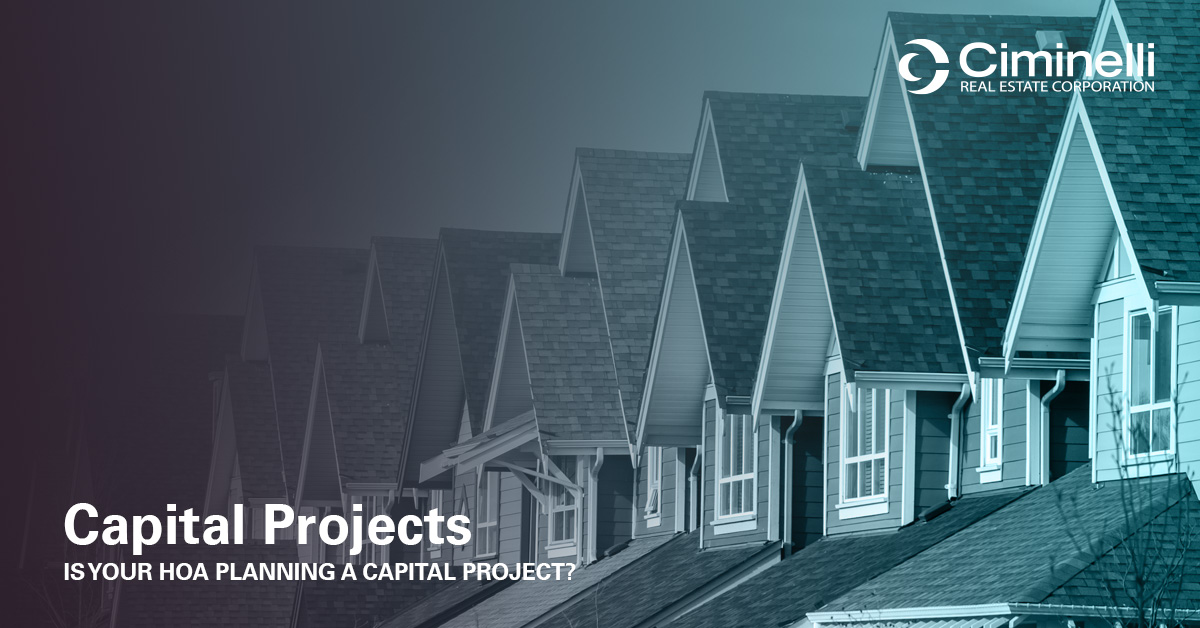
Homeowners’ associations (HOA) have a significant role within their communities. The volunteer group of owners, commonly referred to as the Board, is charged with maintaining common areas, managing budgets/fiscal responsibilities, and enforcing/complying with governing documents of the association. As part of these responsibilities and as is common with any real estate, the oversight of maintenance, repair and major projects of the physical structure is of paramount importance and is ultimately the driver of most decisions the board will make.
In particular, capital projects create some of the greatest liability for the group. The significance of the cost and scale of capital projects often makes them a topic of debate. For this reason, it is also one of the most common reasons a volunteer HOA will contract the services of a professional management firm. Professional insight into equipment and materials lifecycles, budgeting, planning, and funding can be invaluable. We’ll review a few of the critical elements of capital projects below:
Capital Project vs. Maintenance
Typically, an HOA budget will include lines for both maintenance and capital expenditures. Both types of work relate to common areas or shared spaces and exclude singly owned portions of a building and the distinction between the two types of work is quite clear. Typically, capital projects add to the physical condition of a property, increasing an asset’s useful function, like an upgrade to elevator cabs, upgrades to energy efficient lighting, or similar work that increases the value of the asset. Maintenance and repair tasks simply maintain the current level of value and functionality.
HOA/Property Manager’s Role
A professional property manager provides Boards with invaluable information, experience, and insight into building components, bidding processes, and budgeting which can translates into fewer unplanned capital projects and a reduced burden on the community’s finances. Specifically, engaging a Property Manager on a specific capital project ensures proper identification of project scope and deadlines, creation of an action plan, solicitation of contractor bids for board approval, creation of a realistic budget, identify the internal resources a capital project will need, and report on progress through completion to ensure security and provide structure to the project.
Beyond the confines of project specific work, a Property Manager will provide value to the community thorough quarterly property inspections to identify opportunities to increase the value of assets, extend the life of equipment and components, and enhance the community or quality of service. They will also consolidate and catalog data regarding projects and generate capital improvement accounting and reserve studies.
Funding Capital Projects
There are several ways to manage the costs associated with capital and maintenance projects that can have a minimal, or at least an anticipated effect rather than large, unplanned requests for funding.
The most popular and easily understood method of regular and ongoing funding is called a reserve fund. A reserve fund is a standard tool used by Boards to allocate a portion of homeowner assessments specifically for future capital projects, ensuring funding is readily available to match the needs of the capital plan. There are often state laws that regulate the administration of reserve funds making a relationship with a professional management team logical.
At times, the reserve fund alone may not meet the needs of the plan and other funding sources will need to be considered. Loans may be used to fill the gap and allow HOA members to pay for projects over a period of time as the loan terms dictate.
The final funding tool is called a special assessment. Standard assessments are levied by the Board to its’ homeowners to finance unexpected or underfunded capital projects. If a special assessment is needed, it is best practice to consult with an attorney to fully understand the risks and possible outcomes.
Capital projects are a part of living in a managed community and proper planning, evaluation and budgeting will make funding and completing these items easier and ultimately add value to the asset.
